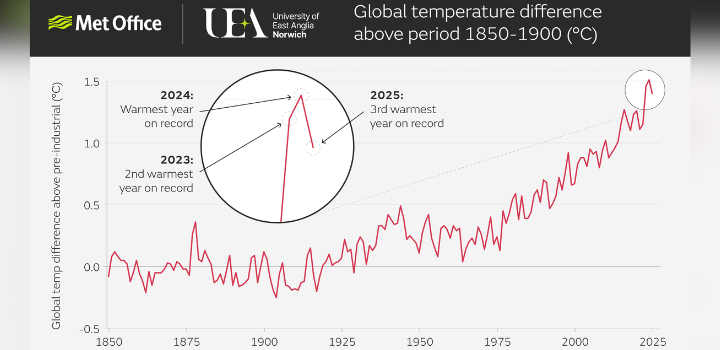UEA in the world’s top 100 sustainable universities
By: Communications

The University of East Anglia (UEA) is in the top 100 universities in the world for sustainability, according to the leading international league table.
UEA is placed 81st globally in the Times Higher Education (THE) Impact Rankings.
The rankings assess universities against the United Nations’ 17 Sustainable Development Goals (SDGs), which aim to provide a blueprint for future peace and prosperity for people and the planet across all UN Member States.
The University comes 12th under SDG 15 - life on land – which measures institutions on their ability to 'protect, restore and promote sustainable use of terrestrial ecosystems and halt biodiversity loss' including combatting biodiversity loss, promoting sustainable forest management and restoring degraded land.
UEA was ranked 27th internationally for ‘Climate Action’, which measures universities’ ‘research on climate change, their use of energy and their preparations for dealing with the consequences of climate change’.
UEA has also risen to 84th in the rankings under the measure for partnerships for the goals, which examines the broader ways in which Universities support the SDG’s with collaboration with other countries, promotion of best practices and publication of data. The University got the maximum 100 score in terms of our annual Sustainable Development Goals report.
The 17 SDG impact rankings cover a range of crucial issues for the planet and humanity including measures on poverty, hunger, sustainability, human rights and collaboration to improve these areas. A full list is found at World University Rankings 2024 | Times Higher Education (THE).
UEA Vice-Chancellor, Prof David Maguire, said:
“Anyone who has been on our beautiful green campus can see and feel the benefits of the programme of projects around environment informed by our ambition to be a 100% net zero institution by 2045 or earlier.
“I’m delighted that our climate action research activity has been recognised by the SDG Impact Rankings and that UEA is among the world’s best universities in terms of sustainability. It’s an absolutely central value of how we operate as an institution and a key part of UEA’s strategic vision and our staff are committed to it.”
Nearly 2,000 institutions worldwide have been ranked - an extended international field that is increased from 1,600 last year.
The result highlights UEA’s dedication to sustainable development, research and partnership across key areas such as clean energy, responsible consumption and climate action, of which there are a number of recent examples:
Climate UEA
Climate UEA brings together UEA’s groundbreaking research work in climate and sustainability and how this knowledge is impacting and informing the world’s leaders and decision makers.
This includes work with the Intergovernmental Panel on Climate Change how data is driving the climate debate and how the world can plan resilience in the face of the threat to our climate.
This month we published our joint research between UEA and the Ocean University of China on how ocean algae plays a key role in producing a compound that can help counter climate change.
Also in June 2024, scientists from UEA published findings on how certain ocean based processes may be hindering the fight to reduce carbon from the oceans.
For over 50 years the UEA Climatic Research Unit (CRU), has lead work in the study of climate change. You can read more about the Unit’s 50 years of research into the climate here.
An award-winning green campus
In 2023 UEA won an internationally renowned Green Flag award for a seventh year in succession for its green spaces.
The Green Flag award is the international quality mark for parks and green spaces illustrating that the space boasts the highest possible environmental standards, is beautifully maintained and has excellent visitor facilities.
UEA’s 360 acres of campus, hosts open parkland, bluebell woods and a broad, (open water space) hosting 5,793 different species of plant and animal, including 108 rare or endangered species.
If you are looking to start university in September 2024 and still thinking about your options, consider joining a UK Top 25 university this September through Clearing.
Related Articles

Scientists discover how fast the world’s deltas are sinking
New research involving the University of East Anglia (UEA) reveals how fast the world’s deltas are sinking and the human-driven causes.
Read more
2025 continues series of world’s three warmest years
2025 is the third warmest year on record in a series from 1850, following 2024 and 2023, according to new data released today.
Read more
Overlooked hydrogen emissions are heating Earth and supercharging methane
Rising global emissions of hydrogen over the past three decades have amplified the impact of the greenhouse gas methane and intensified climate change - according to an international team including researchers at the University of East Anglia (UEA).
Read more